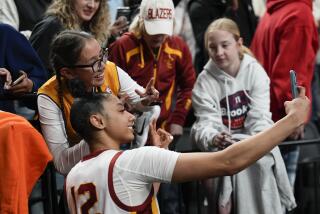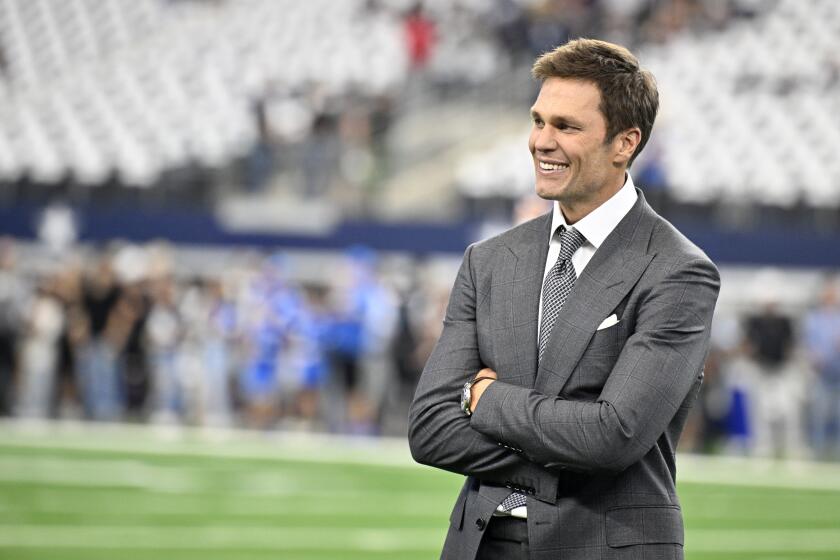Major league teams hope to reduce risk with international draft
Reporting from Mexico City — Two years ago, the tightfisted Oakland Athletics gave $4.25 million to a 16-year-old right-hander whom they had never seen pitch in a game.
It was the biggest bonus ever for a Dominican teenager, the largest in club history and more money than 21 of the players on Oakland’s current major league roster are making.
Yet two years later, after a series of arm ailments, the A’s still haven’t seen Michael Ynoa throw a pitch in a meaningful game. And that could leave Ynoa figuring very heavily in what are sure to be contentious negotiations for a new collective-bargaining agreement between the clubs and players.
The current labor deal expires after the 2011 season, and Commissioner Bud Selig has gone on record as saying he wants an international draft included in the new contract to help rein in bonuses. Currently, only players from the United States, Canada and Puerto Rico are subject to the draft, allowing players from the rest of the world to sign as free agents.
The imposition of a draft would have a major effect on how players are developed and signed throughout Latin America — but nowhere more so than in the Dominican Republic, which sends more players to the big leagues than any country other than the United States. The average signing bonus for players from the Dominican Republic has climbed above $100,000, about 16 times the average yearly income in that country.
“There are a slew of things that could get impacted if the draft were implemented in the Dominican,” says Ulises Cabrera, a former player who now runs a consulting firm that advises some of the country’s top amateur prospects. “The most assured and obvious impact will be in placing an artificial limit on what a player’s value is by removing the only point of leverage — free-market competition — a young Latin American player and his family has.”
Which is kind of the idea, says a front-office executive for an American League team who is not authorized to speak publicly on the upcoming labor talks.
“When you have such a limited history on the kids that are getting this much money, the risk assessment involved in that is pretty high,” said the executive, whose team is in favor of an international draft. “In the international market, like in Latin America, all of a sudden a guy comes on the scene and goes from tryout camp to tryout camp. But unless you’ve got some sort of history with that player, it’s very challenging when you start talking about millions of dollars.”
Wading gingerly into the middle of the fray is Sandy Alderson, a former major league general manager and club chief executive who has been tasked by Selig with cleaning up baseball’s operations in the Dominican, where steroids, fraud and corruption have damaged the game.
Alderson got a sense of how Dominicans view the prospect of a draft when the Santo Domingo hotel where he was staying became the site of a large and emotional protest this spring. But he insists that the draft is just one of many options baseball could use to clean up the sport in the country.
“I’m not there to institute a draft,” he said. “I’m there to deal with some other problems that exist. If we don’t clean up these problems short term, there’s a great likelihood of a draft being imposed. If we’re able to clean up the problem, there will be a less likelihood.”
Charles Farrell, a former Washington Post journalist and a closer observer of Latin baseball as co-founder of the Dominican Republic Sports and Education Academy, agrees that the threat of a draft probably will earn Alderson cooperation on other issues.
And it appears to be working. Sanctioning — or even identifying — an employee who fails a drug test is prohibited in much of the Dominican Republic, but recently the government allowed big league organizations to name and suspend players who test positive for performance-enhancing drugs. And after years of foot-dragging the government has offered to help license and regulate buscones, the independent scouts who find and develop most Dominican players and whose operations have been responsible for much of the fraud and drug use.
“The international draft, at this point, is a leveraging tool for Alderson,” Farrell said. “But [I] hope he wields that tool with a tempered hand. Tempers have flared, with prospects and buscones fearful of what could happen.”
In addition to reducing bonuses, for example, a draft could also lead many teams to rethink the size and operation of their Dominican academies, the backbone of a baseball infrastructure that pours more than $100 million into the struggling Dominican economy each year.
“There are so many ramifications to it,” Seattle Mariners General Manager Jack Zduriencik said.
If a vote were held today, Zduriencik thinks that most clubs would push hard for the draft. But if progress continues to be made on issues such as identity fraud and drug use in the Dominican Republic, he says support would shrink.
“I do think, to some degree, we’re going down that road to try to figure out how to make this thing better,” said Zduriencik, whose team in recent years has signed players from China, El Salvador, Brazil and South Africa as well as the Dominican Republic.
“Change is a scary thing to a lot of people. If you’re sitting in a certain country and you’ve had it your way for many, many years, you’re not going to want to change. That doesn’t mean that it’s not for the betterment of the game.”
More to Read
Go beyond the scoreboard
Get the latest on L.A.'s teams in the daily Sports Report newsletter.
You may occasionally receive promotional content from the Los Angeles Times.











